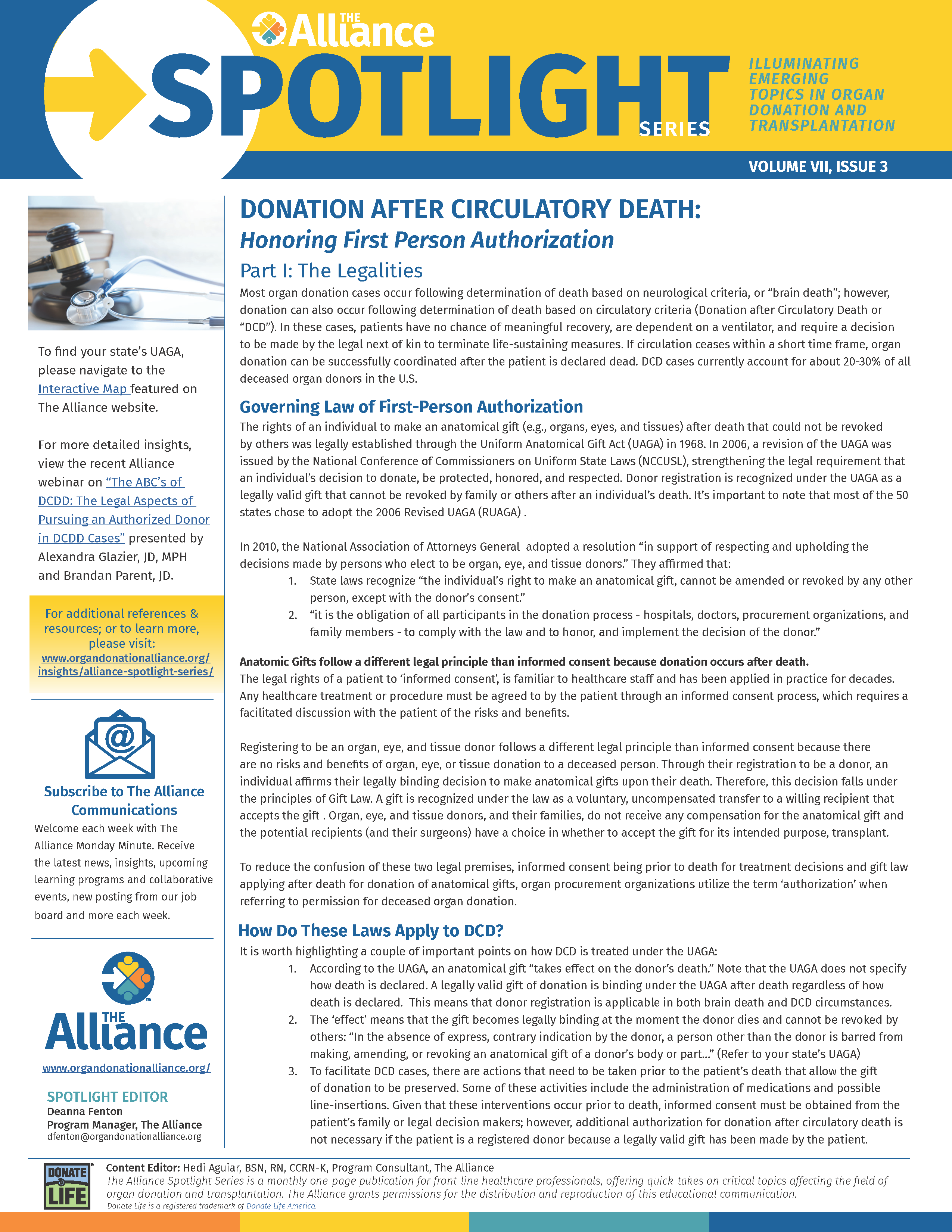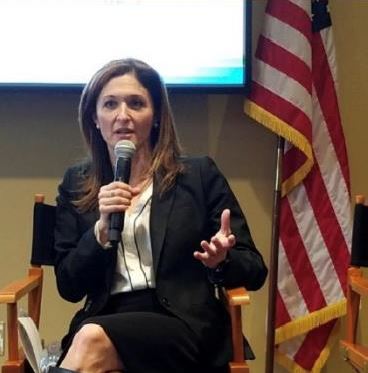Most organ donation cases occur following determination of death based on neurological criteria, or “brain death”; however, donation can also occur following determination of death based on circulatory criteria (Donation after Circulatory Death or “DCD”). In these cases, patients have no chance of meaningful recovery, are dependent on a ventilator, and require a decision to be made by the legal next of kin to terminate life-sustaining measures. If circulation ceases within a short time frame, organ donation can be successfully coordinated after the patient is declared dead. DCD cases currently account for about 20-30% of all deceased organ donors in the U.S.
Governing Law of First Person Authorization
The rights of an individual to make an anatomical gift (e.g., organs, eyes, and tissues) after death that could not be revoked by others was legally established through the Uniform Anatomical Gift Act (UAGA) in 1968. In 2006, a revision of the UAGA was issued by the National Conference of Commissioners on Uniform State Laws (NCCUSL), strengthening the legal requirement that an individual’s decision to donate, be protected, honored, and respected. Donor registration is recognized under the UAGA as a legally valid gift that cannot be revoked by family or others after an individual’s death. It’s important to note that most of the 50 states chose to adopt the 2006 Revised UAGA (RUAGA)[1].
In 2010, the National Association of Attorneys General[2] adopted a resolution “in support of respecting and upholding the decisions made by persons who elect to be organ, eye, and tissue donors.” They affirmed that:
- State laws recognize “the individual’s right to make an anatomical gift, cannot be amended or revoked by any other person, except with the donor’s consent.”
- “It is the obligation of all participants in the donation process – hospitals, doctors, procurement organizations, and family members – to comply with the law and to honor, and implement the decision of the donor.”
Anatomic Gifts follow a different legal principle than informed consent because donation occurs after death
The legal rights of a patient to ‘informed consent’, is familiar to healthcare staff and has been applied in practice for decades. Any healthcare treatment or procedure must be agreed to by the patient through an informed consent process, which requires a facilitated discussion with the patient of the risks and benefits.
Registering to be an organ, eye, and tissue donor follows a different legal principle than informed consent because there are no risks and benefits of organ, eye, or tissue donation to a deceased person. Through their registration to be a donor, an individual affirms their legally binding decision to make anatomical gifts upon their death. Therefore, this decision falls under the principles of Gift Law. A gift is recognized under the law as a voluntary, uncompensated transfer to a willing recipient that accepts the gift[3]. Organ, eye, and tissue donors, and their families, do not receive any compensation for the anatomical gift and the potential recipients (and their surgeons) have a choice in whether to accept the gift for its intended purpose, transplant.
To reduce the confusion of these two legal premises, informed consent being prior to death for treatment decisions and gift law applying after death for donation of anatomical gifts, organ procurement organizations utilize the term ‘authorization’ when referring to permission for deceased organ donation.
How Do These Laws Apply to DCD?
It is worth highlighting a couple of important points on how DCD is treated under the UAGA:
- According to the UAGA, an anatomical gift “takes effect on the donor’s death.” Note that the UAGA does not specify how death is declared. A legally valid gift of donation is binding under the UAGA after death regardless of how death is declared. This means that donor registration is applicable in both brain death and DCD circumstances.
- The ‘effect’ means that the gift becomes legally binding at the moment the donor dies and cannot be revoked by others: “In the absence of express, contrary indication by the donor, a person other than the donor is barred from making, amending, or revoking an anatomical gift of a donor’s body or part…” (Refer to your state’s UAGA)
- To facilitate DCD cases, there are actions that need to be taken prior to the patient’s death that allow the gift of donation to be preserved. Some of these activities include the administration of medications and possible line-insertions. Given that these interventions occur prior to death, informed consent must be obtained from the patient’s family or legal decision makers; however, additional authorization for donation after circulatory death is not necessary if the patient is a registered donor because a legally valid gift has been made by the patient.
To find your state’s UAGA, visit our Interactive Map.








